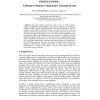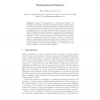170 search results - page 31 / 34 » Arguments, Dialogue, and Negotiation |
COMMA
2006
13 years 8 months ago
2006
In order for one agent to meet its goals, it will often need to influence another to act on its behalf, particularly in a society in which agents have heterogenous sets of abilitie...
SEMWEB
2010
Springer
13 years 4 months ago
2010
Springer
Effective communication in open environments relies on the ability of agents to reach a mutual understanding of the exchanged message by reconciling the vocabulary (ontology) used....
ITS
1992
Springer
13 years 10 months ago
1992
Springer
Abstract. This paper reports our research work in the new field of humancomputer collaborative learning (HCCL). The general architecture of an HCCL is defined. An HCCL system, call...
IJIS
2008
13 years 6 months ago
2008
Abstract. In complex multi agent systems, the agents may be heterogeneous and possibly designed by different programmers. Thus, the importance of defining a standard framework for ...
ARGMAS
2005
Springer
14 years 7 days ago
2005
Springer
Systems of argumentation or ’computational dialectic’ are emerging as a powerful means of structuring inter-agent communication in multi-agent systems. Individual systems of co...


